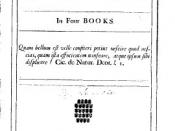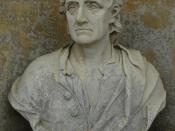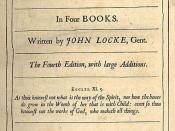John Locke was a seventeenth century philosopher. In his Essay Concerning Human Understanding Locke makes the argument that the mind and body both exist and that they both interact with each other. However, in explaining his reasoning for his theory Locke raises some issues that are not backed with good reasoning. George Berkeley, another philosopher from the same time period, identifies Locke's flaws in his theory and presents his own theories that resolve the problems with Locke's argument.
Locke's theory begins by stating that all ideas are the result of experience of sensations. In book two Locke states this theory:
All ideas come from sensation or reflection. Let us then suppose the mind to be as we say, white paper, void of all characters, without any ideas; how comes it to be furnished? to this I answer, in one word, from EXPERIENCE; in that all our knowledge is founded.
Locke continues on in his theory to say that there are ideas (mind) and qualities (body).
Both of these are divided into two separate parts. Ideas are both simple and complex. Simple ideas come from senses that and unmixed and complex ideas come from more than one sense. Just like ideas, qualities are divided into parts, primary and secondary. All qualities have the power to produce ideas. Primary qualities cause ideas of motion, rest; etc? Secondary qualities are part of primary qualities and consist of colors, textures; etc? Secondary qualities are how we perceive primary qualities. Locke further explains that the body is a representation of ideas and that ideas are caused by qualities of the body. Locke reasons that this is how ideas are formed and how the mind is composed:
The mind being, as I have declared, furnished with a great number of the simple ideas conveyed in by...



Great
this infomation was right to the point and very correct.
3 out of 3 people found this comment useful.